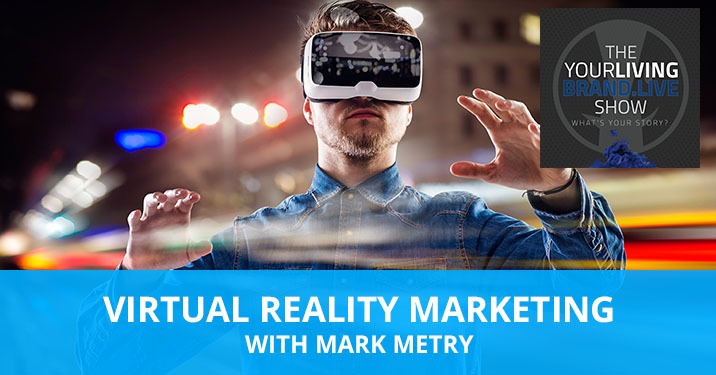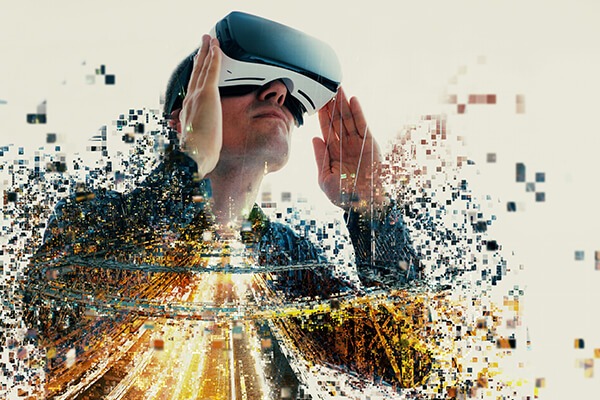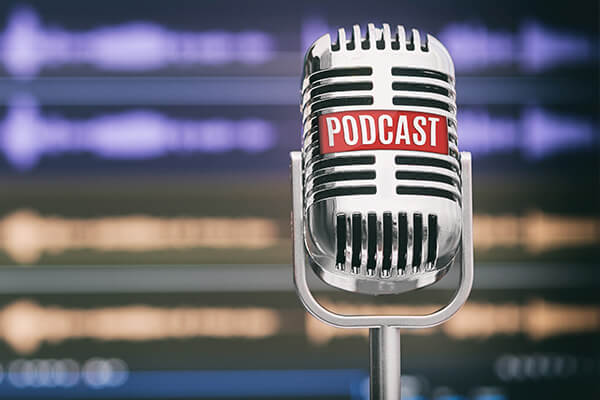
There are so many different places were virtual reality and augmented reality can come into play. They make life easier and give people a much better idea of what they’re doing without killing themselves. One person who saw an opportunity and started early on building his virtual reality agency is VU Dream Founder and Humans 2.0 podcast host, Mark Metry. In this episode, Mark talks about virtual reality marketing and shares his vision, thought process, and insights on the future of marketing and branding.
—
Watch the episode here:
Listen to the podcast here:
Virtual Reality Marketing With Mark Metry
We help people to stop being commodities and start being brands worth loving. What we do is we help our clients understand who they are, what they do, why they do it, who they do it for, and why people should care. The show is all about why should people care about you? Why should people understand that you have value to them and how can you help them make their lives better? When you make their lives better, you stop being a commodity. You start being someone that they trust and you start having more influence.
It isn’t that what it’s all about. It isn’t about being someone that people could trust and somebody that they’re going to come to. Someone who’s not another price but is a partner. We have met Mark Metry on board. Mark has a company called VU Dream and he also has one of the top 50 podcasts out there. Mark talks about how you make people’s lives better through his podcast. It’s all about personal growth and VU Dream is all about augmented reality and virtual reality. Between the two of them, he’s got a great story to tell.
—
Mark, it’s great having you on the show. Thank you for coming from Boston.
Ben, thanks a lot for having me and thank you and everyone out there for reading.
It’s always great having people who do different things on the show. This is what the show is all about. It’s all about what makes you different? What makes you unique? What makes you interesting? Those are the people I want to interview and that’s the people that my audience wants to read about. You do some cool stuff, so tell me a little bit of story about Mark. Where did you come from? What do you do? Who do you do it for? Who are your customers? Most importantly, why do they care? Tell me about the VU and the podcast.
My parents came to the United States from Egypt in 1996, a year before I was born. I’m 21-years-old. I grew up and had some entrepreneurial tendencies. I was unbelievably socially anxious, so I had a decent amount of mental and physical health issues that were both treasures. I set up a lot of troubles in my life. A lot of people know that I do a lot of different things. A lot of people know me for hosting the Humans 2.0 Podcast, which is the top 50 self-help podcast. I’ve been doing it for a little under a year. I did it as a way to do something out there in the world and for my selfish reasons, to learn from people. We all go through different adversity whether it’s in the form of emotional, financial and all these different things. I was thinking, why don’t I start this podcast here as a way to get people to talk to me?
Eight months before I started my podcast, I also started a business called VU Dream. It originally started as something different. What its position now is a marketing advertising growth agency specifically for the virtual reality and augmented reality industry. I started it because I became aware of virtual reality. I was aware of it from playing video games and stuff. As I dug into it, I noticed that it’s not out there in the future. The military uses it to help veterans with PTSD. The mass general is using it to help little children with autism, burn victims. All of this variety of different issues that we don’t necessarily have solutions for, it’s another tool. As I discovered that I’m like, “I need to get into this right now.” A few years from now, when it’s mainstream, then I’ll be positioned as a major leader in that field.
You will be the voice to come to. In years, you’ll be the voice and that’s a cool place to be. When do you start this agency?

I started in December of 2016.
You came up with this idea of doing a virtual reality agency. That’s cool because we have a next-door neighbor whose kid is autistic. I understand where that would be an amazing thing for him. I look at the hotel industry. I look at the commercial real estate agent industry. There are so many different places were virtual reality and augmented reality can come into play, make life easier and give people a much better idea of what they’re doing without killing themselves. You don’t have to jump off a cliff to understand what it looks like to jump off a cliff.
The CTO of Oculus, which is a company that’s owned by Facebook are pushing this thing. He said that, “Virtual reality is the last computing platform. Anything that you could imagine can be created and experienced in VR.” It’s going to be interesting to see how that plays out and especially with augmented reality. That’s going to replace the smartphone and ultimately both of those will disrupt, assist, and facilitate every single industry and every single thing we do like a few years from now.
I’m not sure we’re quite there yet but with AI coming on to affect, gigabit-speed and everything that’s coming along with it, it’s all going to come to ahead. I was telling my son this and I say, “I remember when four megabits of information were huge.” When you had a twenty-megabyte hard drive, that’s enormous and you were cutting edge with. As computing power becomes more powerful and as processors become more powerful, the amount of opportunity that comes along with that, in the software that drives the hardware that creates new opportunities is amazing. I always look at the people that are doing this stuff and I scratch my head because I’m an old-world marketer.
I started off in direct mail when there was no such thing as direct to play. You were stripping film and you’re running $250,000 and $500,000 catalogs at one time. The world has changed, some for the better and some for the worst. It’s an amazing thing to sit there and say, “This is where we were 25 years ago. Here’s where we are. This is where we’re going.” It’s the people that can sit there and say, “This is where we’re going. That’s where I’m going to concentrate. That’s where I’m going to put my time and my effort to be able to put myself in the position.” We may not be there yet, but we’re heading that way. I want to position myself to be there when that becomes your mainstay.
A kid in Africa has more computing power than the US President did 25 years ago. It’s interesting to see that.
When you’re working with your clients and you’re looking at solutions for augmented reality and virtual reality, what are you looking at? What are the problems that you’re seeing? What are the things that people are coming to you and they’re scratching their heads and they’re going, “Help?”
I talked to this guy on my podcast and his name is Jay Samit. We said that augmented reality is going to be the next trillion-dollar industry. If you look at the world, Walmart is using VR for training. Augmented reality is even better for training in some cases in my opinion. Because one of the main issues with training is by the time that the employee understands the information, it’s already been outdated and they’re humans. They can’t get 100% recitation. With the augmented reality, you’re moving the phone and you’re making it unbelievably more contextual to the world. When you can do that, you’re going to be saving billions of dollars. One of the things that we help our clients for the thing that we specialize in is attention. What I mean by that is that the current bridge that the world is at. What I mean is if you’re a VR company and you’re trying to sell a VR product, it’s not the straightest shot is if you are marketing or advertising any other product.
VR and AR are going to disrupt, assist, and facilitate every single industry and every single thing we do a few years from now. Share on XThere’s this funnel that you have to go down because you can’t sell to everyone. You have to sell to people that have got the equipment if you’re selling software. What we do is we help clients hone down who they’re targeting and help build out sustainable growth programs. You’re in the marketing world. I’m sure you’ve gone approached by agencies that are like, “Give us $5,000 and we’ll give you X amount of followers in these many vanity metrics.” That’s bread from the previous nuances of social media like, “Is social media legit? What’s the ROI on social media?” People equated that to the number of followers to the number of whatever you have. It doesn’t mean too much on the grand scale. We help those specific clients build out those and sustainable programs.
I told a client, I said, “The only metric that matters is money in your back pocket at the end of the day.” I’ve been a marketer half my life. If not, longer. You look at social media like, “You look at this metric, look at that metric, and look at their metric.” Are they truly moving the needle? Are they creating value? Are you getting people to understand why they should deal with you rather than deal with your competitors? Are they picking up the phone? Are they giving you their credit card? Are they moving things towards the point where you’re richer than you were the day before? As marketers, we need to be constantly thinking about that because there are many competing avenues for that same dollar. People have many dollars.
They only have so much to invest in marketing. What’s going to give them the best return for their investment? What’s going to give them the best bang for the buck? How are they going to capture the best audience? You’re right. Not everybody is your client. When you can sit there to your clients and say, “These are the people that are your clients. These are the people who aren’t your clients. Why are you spending money on the people that aren’t?” That’s a great way of looking at it. In a canned real simplified manner, what’s the difference between virtual reality and augmented reality? Because some people out there may not know that.
Virtual reality is when you put on a headset and you are 360 degrees fully immersed in a 3D computer-generated environment. There are phone VR headsets and there are standalone VR headsets that run by themselves. There are some that run with the computer. Augmented reality is the Pokémon Go, the Snapchat filter and you’re taking elements from the virtual world. You’re integrating them into the real physical world. When you start thinking about in terms of that, the uses for augmented reality are much greater than VR. Not in the sense of, “This one is better or that,” but they’re tools with different use cases. AR is going to be much more widespread for the average person throughout the rest of their day.
Not everybody likes having that headset over top of their heads. Some people feel claustrophobic about it. It makes them dizzy.
It’s for certain use cases. If you wake up from your house, you’re probably going to have AR glasses or whatever it is. Let’s say, you’re driving to work and you’re in your self-driving car. Maybe you’re in virtual reality for that because maybe you’re playing a game or maybe you’re having a meeting in the car with other people that have VR headsets. There are different use cases, but they are going to be much more widespread.
VR is becoming far more cost-effective and the glasses. Is it Google that made the cardboard glasses?
Yes.
That was the first set my son got where you take your Android phone. You slip it in, sees cardboard glasses and it works. Is it 100%? No, it’s about 90%. For under $20, you’re into the augmented reality and you’re into virtual reality. It’s a neat first step for companies. For people to be able to do it, and it makes it accessible to a large array of people. If you have to go to the ocular glasses, those things are $150, $200 or $500 and up.

The cardboard is like the Nintendo 64. The Sega Genesis of what’s going on. Facebook’s Oculus launched this headset called the Oculus Go, that’s for $200. I have one and it’s standalone, so you don’t need a computer. You don’t need a phone. Its optics are better than the Rift. It’s the one that needs a computer. It doesn’t have as much processing power, but it’s such an unbelievably great mainstream approach.
As technology gets better, it’ll become cheaper. All of a sudden, instead of having to invest in $200 or $500 set of glasses for everybody in your office, you might be able someday to be able to sit there say, “For $25 or $50 a person, we’re going to get this incredible VR experience.” As we look at a couple of years down the road, there’ll be a brand-new $2,000 set that’ll be 100 times better than what we have. That’s the world of technology.
If you look at the scale of different exponential technologies, as a bunch of different ones converge like artificial intelligence, 5G, and IoT. There are an amplifying effect and cost goes down and distribution goes up. It’s going to be interesting. I don’t think anybody knows the future, but that trend, we can say it’s cheaper.
Look at all the computers getting cheaper. There’s more power for the same price. It’s amazing where things go. Let’s talk about Humans 2.0. I love Humans 2.0 and I love what you’re doing with it. I love the conversations that you’re having. They’re meaningful conversations, which is great. You’re getting people to sit there and think, come up with it and there’s an a-ha moment.
What was the impetus? You wanted to learn from people. How has it grown? How have you built this into a podcast that’s on top 50? What is the process involved in going from zero to where you are and what’s the next step?
I came up with the idea. I make the YouTube channel for it in June of 2018. It didn’t take me until the end of August to finally launch the first episode. A lot of that was some procrastination and some fear of failure. I posted whenever and I didn’t take it seriously. I would post two episodes in one day and then I’d skip two weeks, ten, fifteen episodes in, not too many people but some people were like, “This is cool.” Back then, I was much worse. I had this moment whereas an entrepreneur and somebody that’s been able to detect opportunities and pounce on them.
I felt the same thing with the podcast. I’m like, “If I’m at episode ten to fifteen and this has happened, imagine if I tripled down and if I go all out.” I started posting three or five times a week. Once I started doing that two months or three months in, people started listening to the show. Before then, it was getting fifteen to twenty downloads an episode. I started getting feedback and I started to understand what’s good and what’s not good, what people like and what people don’t like. A major catalyst for my podcast success is my stupidity, my dumbness and my ability to listen to somebody and then try to make sense of it. Either regurgitate it back or maybe ask questions to help me get to that point. A lot of people can relate to that.
One thing that I learned, Ben is that there are so many podcasts out there. They’re 575,000 podcasts out there. Most of them end up quitting after episode twenty. The ones that don’t quit, some of them are bad. They have five to ten set standard questions and they’re not even listening to the guest. It’s not a live dynamic conversation and the person on the other end can sniff that out right away. We’re living in an age where there’s so much competition. If you’re not good, people are not going to listen to your podcast.
One of the main issues with training is by the time that the employee understands the information, it's already been outdated. Share on XIf you’re posting once a week and your podcast sucks, nobody’s going to listen to it. It’s that straightforward. You don’t know what you’re doing with marketing, you’re doing it to promote yourself and you don’t have a set purpose. Among a lot of the other things, what I’ve learned is the thing that pushes me and helps me “grow it.” Every single day, I wake up in the morning and after my morning routine, I check Instagram and I go on my LinkedIn.
That is your morning routine.
I get hundreds of messages a day of people telling me, ranging from the generic like, “I love your podcast,” to people saying, “Mark, I watched episode 25 with Tofe Evans. He was running this marathon after his friend tried to get him up when he was depressed. I’m training for a marathon and then I’m helping my friend do it with this.” A mom will hit me up. She’ll get on a call with me and we’ll talk. After that, she’ll be like, “Mark, after you told me to meditate and take cold showers, my entire life has changed. My relationship with my mom is much better and we’re going on a trip.”
You are getting that every single day on a cumulative effect because of many episodes. It’s crazy. That’s the other half. You’ve got to have the spark on your own. Start the idea to get it going and to push through even when it feels like, “Why am I doing this podcast. I’m just a kid. I’m dumb. Nobody wants to listen to me. There are hundreds of thousands of podcasts out there.” Once you make it over that stress thing, then you start getting enough impactful feedback to the point where, if you’re somebody of motivated by that stuff, then you’re going. With Humans 2.0, I haven’t even started yet. I’m excited about this.
It did because it’s interesting because my show started at about the same time yours did. I run my show once a week and you’re right. You sit there going, “Am I doing it enough?” You lead me to say, “Probably not.” I know how much hard work that is. To do it day in and day out, finding guests and having the show, it’s not just on air. This is a lot of fun. I love doing the on-air part of thing but you have to edit it. You have to listen to it. You have to make sure that you do the front and the back end. Make sure that it’s posted properly. There’s a lot of work involved in a podcast that most people don’t have a clue about. It’s a fun thing to do, but you have to sit there and say, “Beyond the self-gratification.” There has to be self-gratification there.
If you’re not getting self-gratification out of it, don’t do it. That’s the number one thing I will tell anybody. Don’t do a podcast to make money. If you make money out of it, it’s a bonus. You’re doing it to help people and you’re doing it to be able to spread the word or have a mission or have an idea that you need to get out there. That’s what a podcast should be about. It’s amazing to me the people that do it consistently and do it well consistently. It’s a hard job. Kudos to you because it’s one of those things to get it out there and get it out there consistently. I take my hat off to you because I know how much hard work it is.
It depends on what your goals are and depends on what your ambitions are. I know that my podcast’s goal is to be the world’s number one podcast. It’s not going to happen when you have people like Tim Ferriss and Joe Rogan, all these other people at the top that are working much harder than me. It’s going to take me a while to get there.
There are bigger teams than you do too.

For me, posting once a week did make sense because that’s where my ambitions were.
I get that. I look at it there saying, “What’s your goal?” That’s a business thing. If you’re running $500,000 company and you’re doing it well, you’re killing it and you’re enjoying what you’re doing, that’s great. Not every company has to be a $500 billion or $1 billion company looking for the next Microsoft buyout. If you like what you’re doing, you enjoy what you’re doing. You can make a reasonable living at it, put some money in the bank and take care of a couple of their families along the way, that’s a neat thing to do. Not everybody has to be a billionaire.
Not everybody is going to be a billionaire. Not everybody is going to be number one. I’m not and that’s okay. I like being where I am. I appreciate it. The people that are building it up, you got to be happy with what you’re doing, know your clients are and know why you’re doing it for your customers. It’s all about self-awareness. When you turn off the mic or walk out of a meeting and you get in your car and you drive away, what’s the one thing you want people to think about you when you’re not in the room?
The reason why I started my podcast is beforehand, I went through this radical transformation. It involves a lot of consumption of other materials like Tim Ferriss’ podcast Impact Theory, reading a bunch of other books. I concluded that all these other podcasters, these authors, these video people, and people out there that create content and push it out there, it has nothing to do with them. They’re trying to be a conduit for the person and the reader. A self-reflection point. What I want people to say about me when I’m gone is, “Mark showed me that I was able to be more of myself.”
It’s about other people. It’s that servitude leadership. It’s helping other people be better. I love people who have that attitude because it makes the world much better.
If Tim Ferriss didn’t exist and all these other people that are creating this content out there, I might not have woken up. I could not be here. It’s doing that for the next person.
Send the elevator down and bring somebody up with you. Mark, thanks for being part of the show.
—
It was great having Mark on the show. He is a wonderful guest. My name is Ben Baker. My company’s Your Brand Marketing. We consult, we do workshops, and we do keynotes. We want to help you be a brand worth loving and stop being a commodity. Talk to us. We want to help you tell your story in a compelling way that people will listen to, they’ll understand, and they’ll engage with.
Important Links:
- Mark Metry
- VU Dream
- Humans 2.0 Podcast
- Oculus
- Jay Samit
- Oculus Go
- Episode 25 – Previous episode Tofe Evans
About Mark Metry

Mark Metry is on Amazon Prime’s TV Docuseries “The Social Media” season 2 attempting to solve some of the world’s biggest problems. Mark is also the Host of the Global Top 100 podcast called Humans 2.0 featured by Forbes, NASDAQ and Yahoo Finance as the “Top 21 Growing Podcasts you must listen to in 2019.”
Mark’s show has been listened to over 5 million times and features the greatest leaders of our time and frequently converses with Billionaires, Professional Athletes, Pulitzer Prize-winning journalists and New York Times Bestselling authors exploring today’s dynamic of the human experience in modern technological times of 2019.
Mark delivers talks, workshops and keynotes centered around human potential, mindset, social anxiety, transformation and using podcasting as a business and has spoken alongside an Olympian gold medalist and hosted next to James Altucher.
Mark Metry is the Founder of VU Dream, a marketing & brand agency founded and operating in Boston, Massachusetts working with startups, individuals & corporations to help customers imagine new future realities in the fields of emerging technology like virtual reality and podcasting.
Love the show? Subscribe, rate, review, and share!

